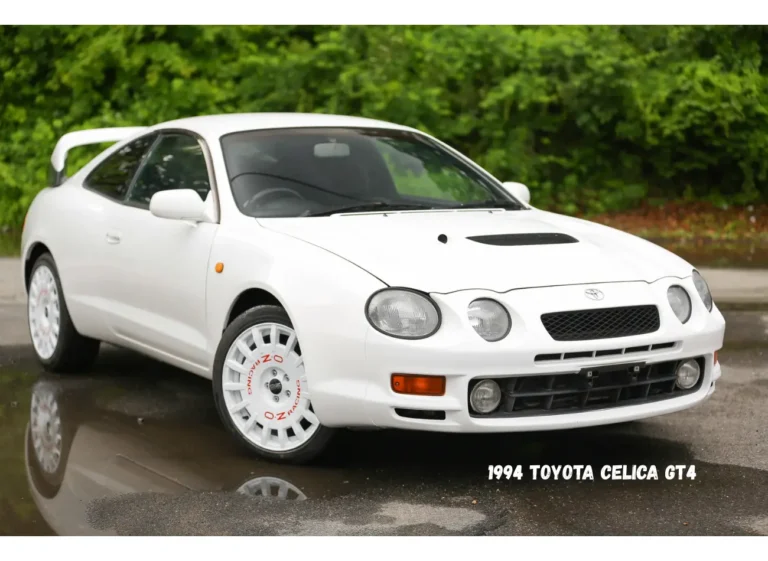Toyota Celica GT4 1995: 10 Mind-Blowing Rally Secrets
The Toyota Celica GT4 1995 stands as the ultimate expression of Japanese rally engineering prowess, representing a technological zenith that transformed competitive motorsport forever. Your journey into understanding this remarkable machine reveals secrets that made it virtually unbeatable on rally stages worldwide, establishing benchmarks that continue influencing modern performance vehicles today.
This ST205 generation embodied the pinnacle of homologation special development. Engineers meticulously refined every system to deliver unprecedented competitive advantage while maintaining street-legal compliance requirements.

Table of Contents
Evolution of the Toyota Celica GT4 1995 Platform
The final iteration of Toyota’s rally weapon incorporated lessons learned from years of World Rally Championship competition. Your appreciation for its capabilities expands when examining the revolutionary improvements over its predecessors. The Toyota Celica GT-Four designation represented more than marketing terminology—it signified engineering excellence refined through motorsport crucible testing.
Compared to the 1994 Toyota Celica GT4, the 1995 model featured enhanced aerodynamics, improved cooling systems, and optimized powertrain calibrations that elevated performance to extraordinary levels.

10 Mind-Blowing Rally Secrets of the Toyota Celica GT4 1995
Secret 1: Anti-Lag System Implementation
The sophisticated anti-lag turbocharger management prevented boost pressure loss during gear changes. Your turbo remained spooled between shifts, eliminating lag that plagued competitor vehicles during critical acceleration phases.
| System Component | Function | Performance Benefit |
|---|---|---|
| Secondary Air Injection | Maintains exhaust flow | Eliminates turbo lag |
| Ignition Retardation | Controls combustion timing | Preserves turbine speed |
| Fuel Enrichment | Prevents overheating | Ensures reliability |
Secret 2: Active Center Differential Technology
The electronically controlled center differential automatically adjusted torque distribution based on driving conditions. Real-time sensors monitored wheel slip, steering input, and throttle position to optimize traction instantaneously.
Secret 3: Aerodynamic Pressure Management
Wind tunnel development created subtle bodywork modifications that generated significant downforce increases without compromising drag coefficients. The Toyota Celica Gran Turismo 4 featured integrated vortex generators and optimized underbody paneling that enhanced high-speed stability dramatically.
Secret 4: Enhanced Cooling Circuit Architecture
Redesigned coolant flow patterns and enlarged heat exchanger capacity prevented thermal limitations during sustained competition use:
- Primary radiator: 40% larger core volume
- Oil cooler integration: Dedicated transmission cooling circuit
- Intercooler efficiency: 25% improvement in heat rejection
- Thermostat calibration: Lower opening temperature for consistent operation
Secret 5: Suspension Kinematics Refinement
Revised suspension geometry optimized camber curves and roll center heights for improved tire contact patch consistency. Your cornering speeds increased through enhanced mechanical grip generation across varying surface conditions.
Secret 6: Engine Management Sophistication
The 3S-GTE powerplant utilized advanced knock detection algorithms and adaptive fuel mapping that maximized performance while preserving engine longevity. Sophisticated boost control prevented overboost conditions that destroyed competitor engines.
Secret 7: Transmission Gear Ratio Optimization
Carefully selected gear ratios matched engine powerband characteristics to typical rally stage requirements. The close-ratio gearing maintained optimal engine speed ranges for maximum turbo effectiveness across diverse terrain types.
Secret 8: Weight Distribution Engineering
Strategic component placement achieved ideal front-to-rear weight balance while maintaining low center of gravity positioning. Battery relocation and fuel tank repositioning contributed to enhanced handling dynamics.
Secret 9: Brake System Integration
Ventilated disc brakes featured optimized cooling duct routing and advanced pad compound formulations. Your stopping capability remained consistent during extended high-performance driving sessions that overwhelmed lesser systems.
Secret 10: Homologation Special Production Techniques
Limited production runs ensured each vehicle received individual attention during assembly processes. Hand-selected components and precision calibration procedures guaranteed consistent performance across all examples produced.
Performance Specifications Analysis
| Metric | Toyota Celica GT4 1995 | Previous Generation | Improvement |
|---|---|---|---|
| Maximum Power | 255 hp @ 6000 rpm | 242 hp @ 6000 rpm | +13 hp |
| Peak Torque | 224 lb-ft @ 3200 rpm | 224 lb-ft @ 3200 rpm | Optimized delivery |
| 0-60 mph | 5.4 seconds | 5.6 seconds | -0.2 seconds |
| Top Speed | 153 mph | 145 mph | +8 mph |
Rally Heritage and Competition Success
The celica rally program achieved unprecedented success during the mid-1990s championship seasons. Your understanding of this dominance stems from recognizing how street-legal homologation requirements transferred genuine competition technology to production vehicles.
Championship victories across multiple continents validated the platform’s engineering excellence. Professional drivers praised the intuitive handling characteristics and bulletproof reliability that enabled consistent podium finishes throughout grueling competition seasons.

Maintenance and Ownership Considerations
Your Toyota Celica GT4 1995 requires specific maintenance protocols to preserve its exceptional capabilities:
Critical Service Intervals
- Turbocharger system: Premium synthetic oil changes every 3,000 miles
- All-wheel-drive components: Differential fluid replacement every 25,000 miles
- Timing belt service: Replacement every 60,000 miles with tensioner updates
- Cooling system: Complete flush every 30,000 miles using OEM-specification coolant
Performance Preservation Tips
- Allow proper warm-up cycles before spirited driving
- Monitor boost pressure readings for turbocharger health
- Inspect intercooler piping connections regularly
- Maintain proper tire pressures for optimal handling
Modern Collectibility and Market Trends
Appreciation rates reflect growing recognition of the Toyota Celica GT4 1995’s significance within automotive history. Your investment potential increases as enthusiast demand outpaces available supply of well-preserved examples.
Pristine specimens command substantial premiums, while modified examples require careful evaluation of modification quality and reversibility. Original components become increasingly valuable as replacement parts availability diminishes.
Conclusion
The Toyota Celica GT4 1995 represents the ultimate fusion of rally-bred engineering excellence and street-legal practicality, incorporating ten revolutionary secrets that established its legendary status among performance enthusiasts worldwide. Your ownership of this remarkable machine connects you to a legacy of motorsport innovation that transformed competitive rallying forever. These carefully guarded engineering secrets created a platform that dominated rally stages while providing exhilarating street performance that remains compelling decades after production ceased.
The sophisticated systems working in perfect harmony delivered a driving experience that transcended conventional performance benchmarks, establishing the Toyota Celica GT4 1995 as the definitive rally-bred sports car of its era.
Frequently Asked Questions (FAQ)
Q: What distinguishes the Toyota Celica GT4 1995 from earlier GT4 models? A: The Toyota Celica GT4 1995 featured enhanced aerodynamics, anti-lag turbo system, improved cooling capacity, and refined suspension geometry that delivered superior performance compared to previous generations.
Q: How many Toyota Celica GT4 1995 vehicles were produced? A: Toyota manufactured approximately 2,500 units of the Toyota Celica GT4 1995 for worldwide distribution, making it one of the rarest homologation specials ever produced.
Q: Is the Toyota Celica GT4 1995 suitable for daily driving? A: With proper maintenance, the Toyota Celica GT4 1995 provides excellent daily usability while offering rally-car performance when desired, combining practicality with extraordinary capability.
Q: What should I expect to pay for a Toyota Celica GT4 1995 today? A: Well-maintained Toyota Celica GT4 1995 examples typically command $25,000-$45,000, with pristine original specimens reaching significantly higher values in current collector markets.
Ready to experience the legendary performance of the Toyota Celica GT4 1995? Research available examples, connect with knowledgeable specialists, and join the exclusive community of owners who appreciate this ultimate rally weapon. Share your GT4 adventures and discover the secrets that made this machine unstoppable!
Did You Like This Article?
skQzeggGVXXXJXru
KqWopPlNFjEZXWHEzgGF
FJ Returns
Waiting to order it!
vmqIfeXKmucuDGwQGabX
GqYadOddQZSVFKDoeN
Celica come back
Very informative and useful, details.
Good article
A lot information, thanks







